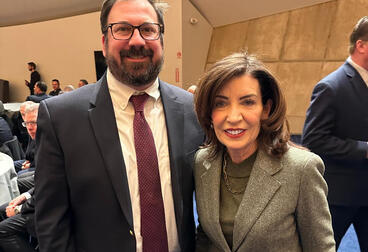U.S. local, state and federal labor laws are subject to being tossed out by a secret trade court that negotiators wrote into the controversial Trans-Pacific Partnership socalled free trade pact, a top law professor who opposes the TPP says.
In a Sept. 7 telephone press conference on the trade pact, Alan Morrison, associate dean for public interest law at George Washington University, explained the secret court, formally called the Investor-State Dispute System (ISDS), would have the power to kill any federal, state or local labor laws or even pro-worker presidential decisions unilaterally.
And only investors and corporations can bring cases to the ISDS, challenging laws and rulings, Morrison added. If they win, by showing harm to present or future profits, the measures are dead and affected governments can't appeal. Other speakers added that after such rulings, governments, i.e. taxpayers, would be on the hook for huge damages.
The ISDS is one of the most-controversial sections of the already controversial TPP, said Lori Wallach, director of Public Citizens Trade Watch, who organized the briefing. Other speakers noted that ISDS only backers are U.S.-based multinational corporations.
It's also drawn the ire of U.S. workers and unions and existence of the ISDS within the trade pact is one reason Democratic President Barack Obama delayed sending legislation to implement the TPP not the pact itself to Congress for up-or-down votes.
But since reports say Obama plans to do so this month, workers, environmental groups, religious and community groups and their allies have been out campaigning against it and intend to do so through the November election and beyond, speakers said. If Obama follows through, the TPP legislation could come up in Congress lame-duck session.
Three-member ISDS tribunals would decide the cases, with no rights to appeal rulings and no opportunity for anyone other than governments to formally contest cases. Trade lawyers would compose the tribunals when they're not bringing cases for the multinationals.
As a result, Morrison said, ‰ÛÏIf a city raised its minimum wage to $15 an hour, an investor or a corporation could challenge that as a threat to its profits.
That's not far-fetched. Sen. Elizabeth Warren, D-Mass., who led off the press conference, noted that a mining company used an ISDS threat to force the Indonesian government to give in when that nation decided to oppose environmentally ruinous extraction.
Faced with the prospect of a multimillion-dollar fine imposed on their poor country, officials retreated, Warren said. The fine made up for lost profits. And Canada paid a $300 million fine for lost profits in a similar environmental ISDS case under NAFTA, she added, ISDS's a unique threat, Warren explained. It allows companies to challenge laws they don't like and win millions or even billions of dollars from taxpayers.
And it shifts the power from U.S. courts to unaccountable international tribunals of corporate attorneys to decide such cases, she noted.
Date Posted

